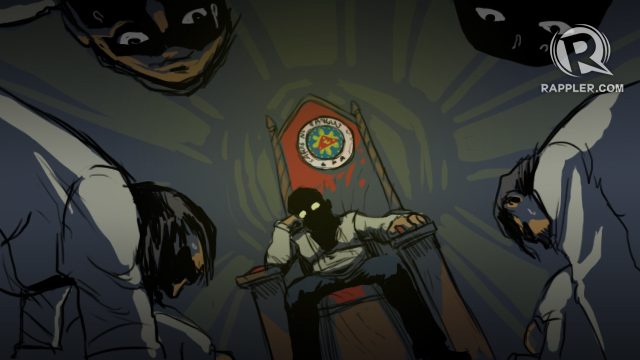SUMMARY
This is AI generated summarization, which may have errors. For context, always refer to the full article.

The phrase “I serve at the pleasure of the President” is the common retort used by embattled Cabinet officials to fend off frenetic calls to resign. We heard these words quite regularly during the term of President Gloria Macapagal-Arroyo.
A few years back former Customs Commissioner Ruffy Biazon was bombarded with resignation demands after his name was dragged into a malversation indictment arising from the PDAF scandal. Expectedly, he initially insisted that presidential appointees serve at the pleasure of President Noynoy Aquino.
He later on relented saying, “but I also believe that public officers serve with the trust of the Filipino people” and tendered his irrevocable resignation. Sadly, this lone act of delicadeza did not portend a new governance frame of mind in the executive branch. Indeed, most politicos that have passed through the halls of Malacañang do not possess this organic sense of shame when their performance in office is challenged.
Notably, this “pleasuring the President” dogma has found its way in legislation. For example, under the Department of the Interior and Local Government Act of 1990, “The authority and responsibility for the exercise of the Department’s powers and functions shall be vested in the Secretary, who shall hold office at the pleasure of the President.”
Correspondingly, creative legalists from the executive ranks have traditionally asserted that this “pleasuring the President” principle fundamentally means that they hold their posts at the complete sufferance of their boss. Thus transforming this legal notion into a chronically abused excuse to cling on a little bit more to one’s office. And in most cases, much to the displeasure of the public.
Clashing principles
It can certainly be argued that this conventional view contradicts the republican and democratic principles the Philippines ascribes to. Specifically, in Section 1 of Article II of the Constitution which states that government authority emanates from the people.
Hence, once these officials assume their executive posts, the public expects full devotion to the constituency of their mandate and no longer to the person who extended their appointment.
Accordingly, it is only reasonable, for example, to expect from the Secretary of the DILG that he will champion the autonomy of local governments. Unfortunately, experience has instead shown that past DILG secretaries are more adept at devising schemes to utilize local leaders to serve the interests of the president.
However, the most objectionable aspect of this “privilege” within the executive branch is that it allows cabinet secretaries and other officials of similar stature, indeed the very people tasked to manage public interest portfolios, to deflect demands of accountability.
By allowing them to assert the prerogative of pleasuring the President first and foremost, they are in effect relieved of the obligation to justify their actions (or inaction) to the people. This is of course an absolute travesty because a public office is a public trust. Meaning, all public officials, including the President, serve at our pleasure above all else!
Furthermore, the delegation involved here certainly does not mean setting aside ethics and common sense. Indeed, when public trust is breached, then the holder of the office is morally and rationally obliged to relinquish the position.
This move should not be treated as an admission of guilt but plainly as heeding the people’s lack of confidence on the public official concerned. Clearly, the “pleasuring the President” dogma must lose its purchase when the people’s displeasure and disapproval have been sufficiently articulated.
‘Public trust’
Sadly, this idea of performing public duties to pleasure the president is firmly entrenched in our political culture because it is actually anchored on how executive power is defined here. According to the Supreme Court in the landmark case of Marcos vs. Manglapus (G.R. No. 88211- October 27, 1989):
“The powers of the President are not limited to what are expressly enumerated in the article on the Executive Department and in scattered provisions of the Constitution. This is so, notwithstanding the avowed intent of the members of the Constitutional Commission of 1986 to limit the powers of the President as a reaction to the abuses under the regime of Mr. Marcos, for the result was a limitation of specific power of the President, particularly those relating to the commander-in-chief clause, but not a diminution of the general grant of executive power.”

The bitter irony is that those terrible years under the Marcos dictatorship should have jolted our heads not to give too much power to a single person. And yet Sections 1 and 17 of Article VII still do exactly that.
Needless to say, the aforementioned characterization of Malacañang prestige by the Supreme Court dispels any question at all on the sublime authority of the President over the executive branch of government.
Indeed, the durability of the “pleasuring the President” mindset despite its blatant dictatorial underpinnings is just one of the many pathologies in our Constitutional begging for reform. At this juncture, South Korea’s executive structure in its constitution is worth noting.
Article 66 (4) of the Constitution of the Republic of Korea explicitly provides that “Executive power shall be vested in the Executive Branch headed by the President.” The other members of the Executive Branch are the Prime Minister (see Article 86) and the Supreme Council (see Article 88).
The most notable difference in the South Korean model is that executive power is given to an institution and not to a person. Moreover, under this framework, the exercise of executive power is diffused because the same is technically held by 3 persons. And therefore the responsibility to manage government is accordingly distributed. The fate of the nation’s affairs does actually not revolve around a single person.
There is without doubt an urgent need to recalibrate attitudes about executive power. Obviously, there is no denying that Malacañang’s strong influence in all matters of government is the very life-source of political patronage. Patronage of course, is the very lifeblood of political dynasties. And the unabated reign of dynastic politicians is the very evil that sustains graft and corruption in our political system. And every Filipino knows from personal experience that graft and corruption in government is the biggest bane in our country’s development.
Therefore, the unhealthy practice of politicos performing their public duties at the pleasure of the President has to stop. But since constitutional reform remains to be elusive, then the onus is now on the electorate to keep this anomaly in mind when evaluating Binay, Roxas or whoever else is aspiring for Malacañang in 2016. – Rappler.com
Michael Henry Ll. Yusingco, LL.M is a practicing lawyer. He is the author of the book “Rethinking the Bangsamoro Perspective.” He researches on current issues in state-building, decentralization and constitutionalism.
Add a comment
How does this make you feel?





There are no comments yet. Add your comment to start the conversation.